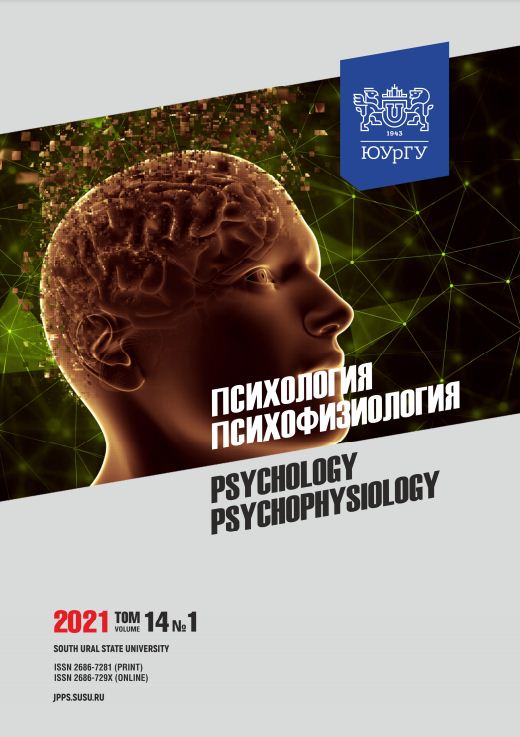INDIVIDUAL PSYCHOLOGICAL TRAITS IN INTERNET ADDICTED PEOPLE
Abstract
Abstract. The accelerating development of digital technologies and the greater availability of the Internet lead to the fact that some users are immersed in virtual space so densely that it results in Internet addiction. Most of the studies of Internet addiction have been conducted on schoolchildren and students. However, the question of studying this phenomenon on the generation Y sample remains open. Aim: the paper aims to identify the individual psychological traits of Internet addicted people. Materials and methods. The sample consisted of 289 people ages 18-38 (X = 23.7; SD = 5.26), of which 137 were female (47.4%) and 152 were male (52.6%). To identify Internet addiction, the Chen Internet Addiction Scale was used, as well as the 16-PF questionnaire (form C), which allows studying the individual psychological traits of a person. Descriptive statistics, the Kruskal–Wallis H, and the Spearman rank correlation coefficient were used for processing the data. Mathematical processing was carried out using IBM SPSS Statistics v. 17.0. Results. As a result of the study, it was revealed that an internet addicted adult is characterized by emotional instability, low rule-consciousness, high anxiety, traditionalism, low self-control and emotional tension. As the person becomes more addicted to the Internet, there is an increase in the quantitative indicators of these personal traits. Conclusion. Individual psychological traits of an internet addicted person have been determined, which can be used for the development and implementation of the corrective program for this type of addictive behavior.
Downloads
References
2. Voiskounsky A.E. Perspectives of formation of internet psychology. Psikhologicheskii zhurnal = Psychological Journal. 2013; 34 (3): 110–118. (in Russ.). URL: https://www.elibrary.ru/ item.asp?id=20132655
3. Malygin V.L., Merkureva Yu.A., Khomeriki N.S. et al. Internet-dependent behavior: biological, psychological and social risk factors of formation in adolescents. Profilaktika zavisimostei = Prevention of addictions. 2015; 4 (4): 61–65. (in Russ.). https://www.elibrary.ru/item.asp?id=25066047
4. Egorov A.Yu. Modern views on internet addiction and approaches to its correction. Meditsinskaya psikhologiya v Rossii = Medical psychology in Russia. 2015; 4 (33). (in Russ.). URL: https://www.elibrary.ru/item.asp?id=26375084
5. Kibitov A.O., Trusova A.V., Egorov A.Yu. Internet addiction: clinical, biological, genetic and psychological aspects. Voprosy narkologii = Narcology issues. 2019; 3 (174): 22–47. (in Russ.). DOI: 10.47877/0234-0623_2019_3_22
6. Trusova A.V., Grechanyi S.V., Soldatkin V.A. et al. Internet addiction predictors: analysis of psychological factors. Obozrenie psikhiatrii i meditsinskoi psikhologii imeni V.M. Bekhtereva = V.M. Bekhterev review of psychiatry and medical psychology. 2020; 1: 72–82. (in Russ.). DOI: 10.31363/2313-7053-2020-1-72-82
7. Griffiths M.D., Kuss D.J., Billieux J., Pontes H.M. The evolution of Internet addiction: A global perspective. Addictive Behaviors. 2016; 53: 193–195. DOI: 10.1016/j.addbeh.2015.11.001.
8. Moreno M.A., Eickhoff J., Zhao Q. Problematic Internet Use: A Longitudinal Study Evaluating Prevalence and Predictors. The Journal of Pediatrics: X. 2019; 1: 100006. DOI: 10.1016/j.ympdx.2019.100006
9. Zenebe Y., Kunno K., Mekonnen M. et al. Prevalence and associated factors of internet addiction among undergraduate university students in Ethiopia: a community university-based cross-sectional study. BMC Psychology. 2021; 9: 4. DOI: 10.1186/s40359-020-00508-z
10. Shen Y., Wang L., Huang C. et al. Sex differences in prevalence, risk factors and clinical correlates of intrnet-addiction among Chinese college students. Journal of Affective Disorders. 2021; 279: 680–686. DOI: 10.1016/j.jad.2020.10.054
11. Dong G.-H., Wang M., Wang Z. et al. Addiction severity modulates the precuneus involvement in internet gaming disorder: Functionality, morphology and effective connectivity. Progress Neuropsychopharmacology and Biological Psychiatry. 2020; 98: 109829. DOI: 10.1016/j.pnpbp.2019.109829.
12. Alimoradi, Z., Lin, C.-Y., Broström, A. et al. Internet addiction and sleep problems: A systematic review and meta-analysis. Sleep Medicine Reviews. 2019; 47: 51–61. DOI: 10.1016/j.smrv.2019.06.004
13. Sun Y., Zhang Y. A review of theories and models applied in studies of social media addiction and implications for future research. Addictive Behaviors. 2021; 114: 106699. DOI: 10.1016/j.addbeh.2020.106699.
14. Kuss D.J., Kristensen A.M., Lopez-Fernandez O. Internet addictions outside of Europe: A systematic literature review. Computers in Human Behavior. 2021; 115: 106621. DOI: 10.1016/j.chb.2020.106621
References on translit
.


